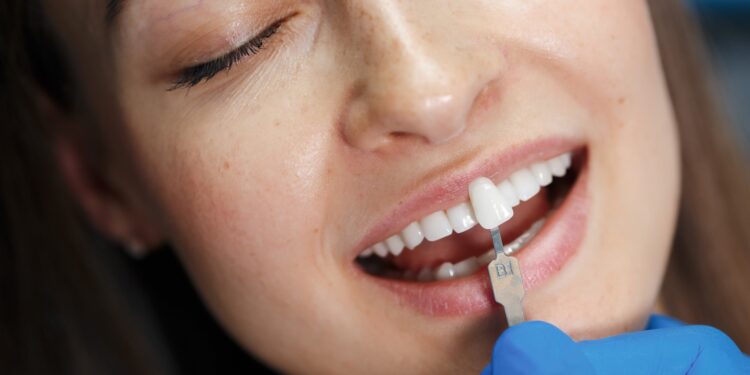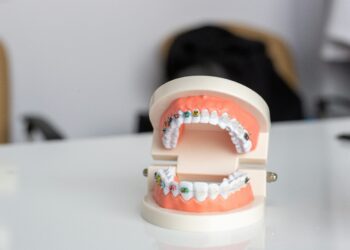There’s a certain confidence that comes with having a nice, clean dentition. You’d love to show it off by laughing, talking, and smiling almost all the time. Unfortunately, some of us aren’t so lucky in that department. Thankfully, science has made it easy to change the parts of ourselves we feel less secure about. Enter dental veneers—the 20th-century miracle. While this cosmetic procedure has grown and become very popular since its invention, is it something you should consider getting as a way of enhancing your appearance? This article will serve as an explainer, and provide you with everything you need to know before you take the big step.
What are Teeth Veneers?

According to Cleveland Clinic, dental veneers are custom-made shells that are fitted kept over the front surfaces of one’s teeth. These artificial fixtures help to conceal chips, stains, cracks or any imperfections in the teeth. Depending on one’s unique problem, there are different types of veneers available to solve your needs.
Who Should be Getting Veneers?
There’s no discrimination for getting dental veneers; anyone who wants to be confident when smiling or talking can explore this cosmetic enhancement procedure. Some of the candidates for this procedure includes, but are not limited to individuals with diastema, small teeth, malformed teeth, chipped or broken teeth, stained teeth e.t.c.
What are the Different Types of Veneers?

There are several types of dental veneers, each with its unique characteristics. Let’s explore them:
1. Porcelain Veneers:
These are also known as dental porcelain laminates and it is usually wafer-thin and custom-made from shells manufactured from tooth coloured materials. These unique shells are then affixed to the front surface of one’s teeth.
Advantages
- It is made from porcelain so these veneers are made to match the natural teeth color.
- It can last for 10 to 15 years.
- It is biocompatible so it doesn’t negatively affect the gum tissue.
- It is resistant to stains.
Disadvantages
- This veneer type is much more expensive than its counterparts.
- Porcelain veneers are irreversible as it requires the enamel to be removed. Once enamel is removed, it cannot be restored naturally.
2. Composite Veneers:
This is an excellent alternative to Porcelain veneers and just like its name, it is made from composite resin material. Composite veneers are usually applied directly to the teeth and shaped by the dentist.
Advantages
- It is much more affordable than Porcelain veneers.
- It serves to address issues such as chips, gaps and discolouration.
Disadvantages
Composite resin material can be prone to staining over time, particularly if you consume foods and drinks that cause discoloration (like coffee or red wine).
Regular maintenance is required since they are not as durable.
3. Palatal Veneers (Palatal Onlays):
Palatal veneers or palatal onlays, are custom-made veneers that are typically used to restore the anterior (front) or back portions of the teeth.
Advantages
- This veneer type is strong and durable, hence it lasts longer..
- Palatal veneers can enhance your bite, contributing to better overall dental function.
- Palatal veneers also help to protect the gums and surrounding tissues.
Disadvantages
- Palatal veneers can be costly to get.
- Some patients experience tooth sensitivity after getting this procedure done.
- Maintenance can be quite tasking.
4. Lumineers:
Lumineers are often called “no-prep” veneers and are manufactured by DenMat Dental Laboratory. This veneer type is on the popular spectrum because it requires little to no teeth preparation for the procedure.
Advantages:
- Lumineers are ultra-thin (0.2 mm) and translucent brand of veneers.
- Minimal enamel removal is required for this cosmetic procedure.
- It is perfect for patients with tooth gaps, chips, or deep stains.
Disadvantages:
- Lumineers are ultra-thin so it can limit their ability to hide severe discoloration or correct major tooth misalignment.
- Lumineers have limited customization options because they come in standard shapes and sizes, hence, it may not perfectly match your natural teeth or desired aesthetics.
Removable Veneers (Non-Permanent):
Removable veneers, also called clip-on veneers, are custom-made, thin prosthetics that are made to fit over your natural teeth. They’re manufactured from resin or high-grade dental plastic.
Advantages:
- Removable veneers are more affordable than permanent ones.
- They can be easily taken out whenever.
Disadvantages:
- Removable veneers are unable to correct major misalignments or significant dental issues.
- These veneers are not as durable as permanent veneers.
- Aesthetic-wise, these veneers do not look as natural as permanent ones.
Takeaways
- Only consider getting dental veneers if you have no gum disease, extensive cavities or any oral health issues.
- Always keep in mind that veneers are irreversible. Once you get them, they require ongoing care and maintenance.
- As always advised before getting any cosmetic alterations of any kind, professional assessment is crucial. A dentist can guide you based on your unique situation.

















